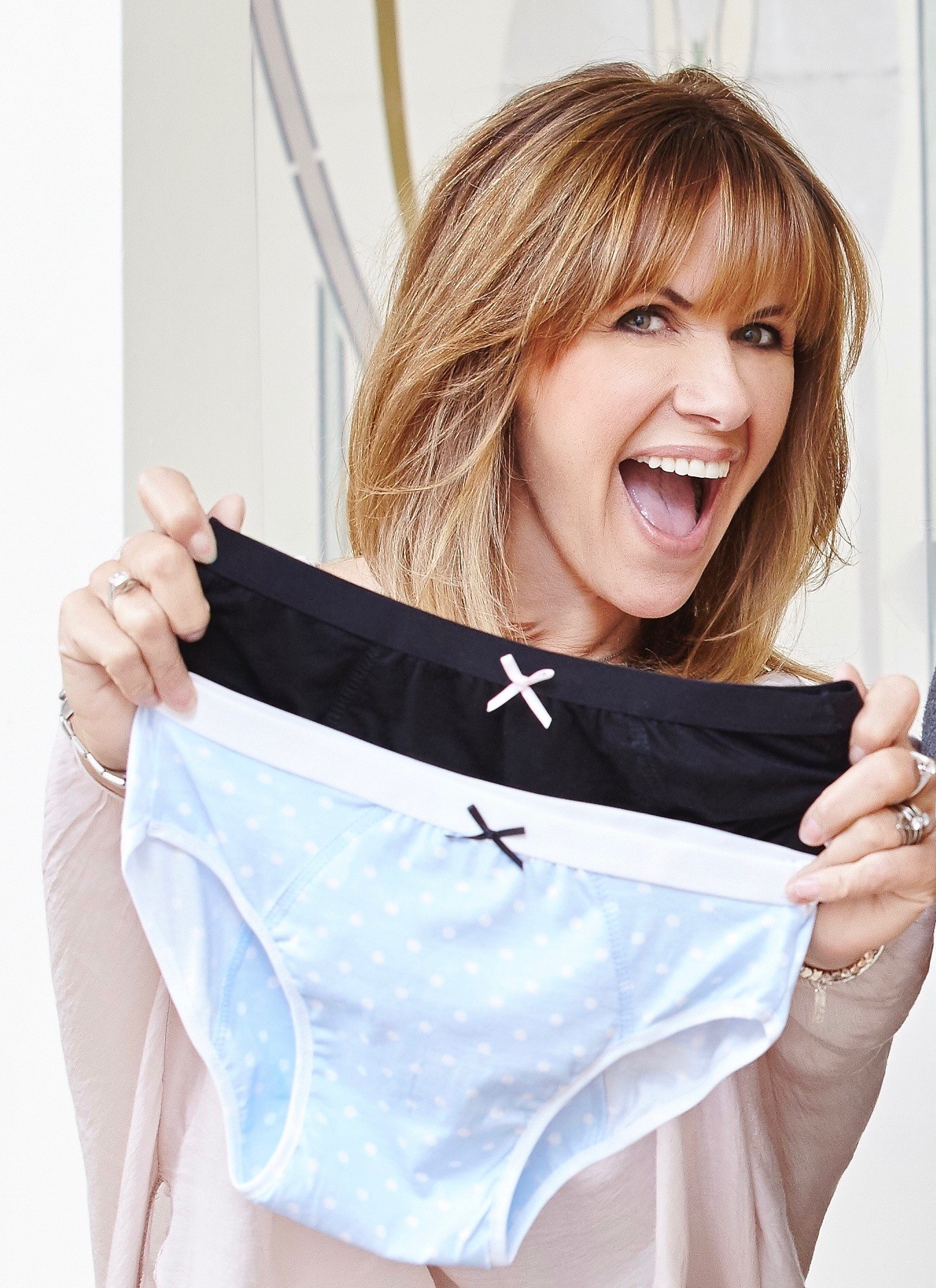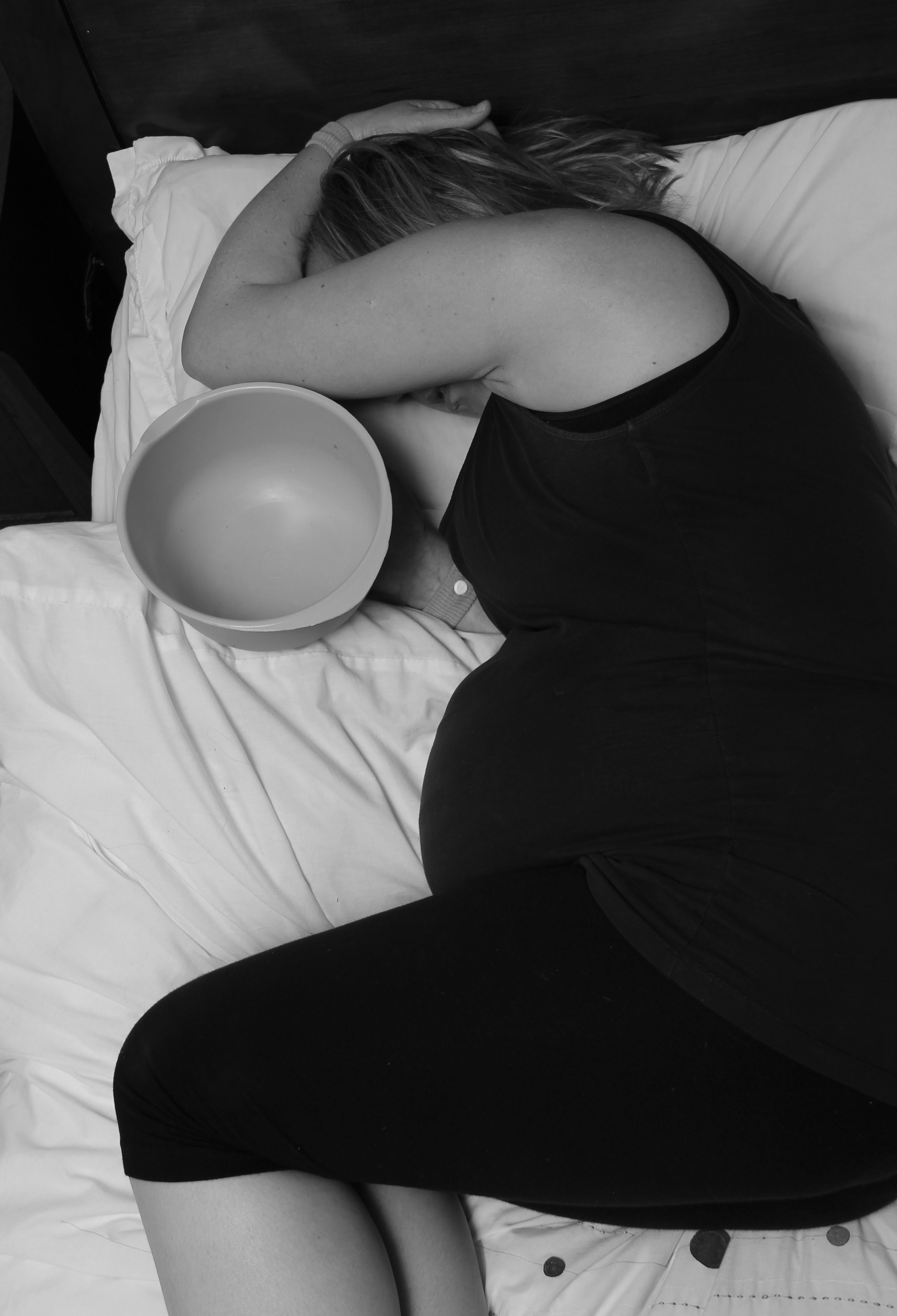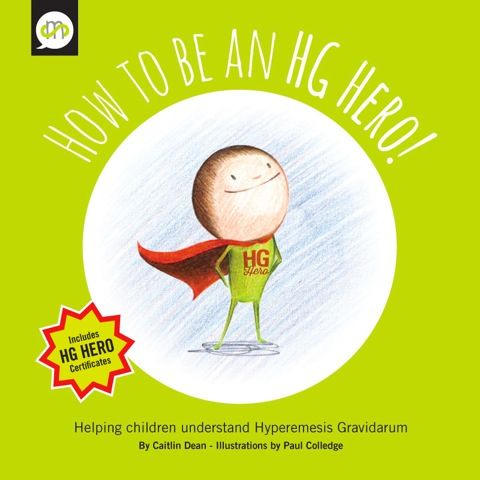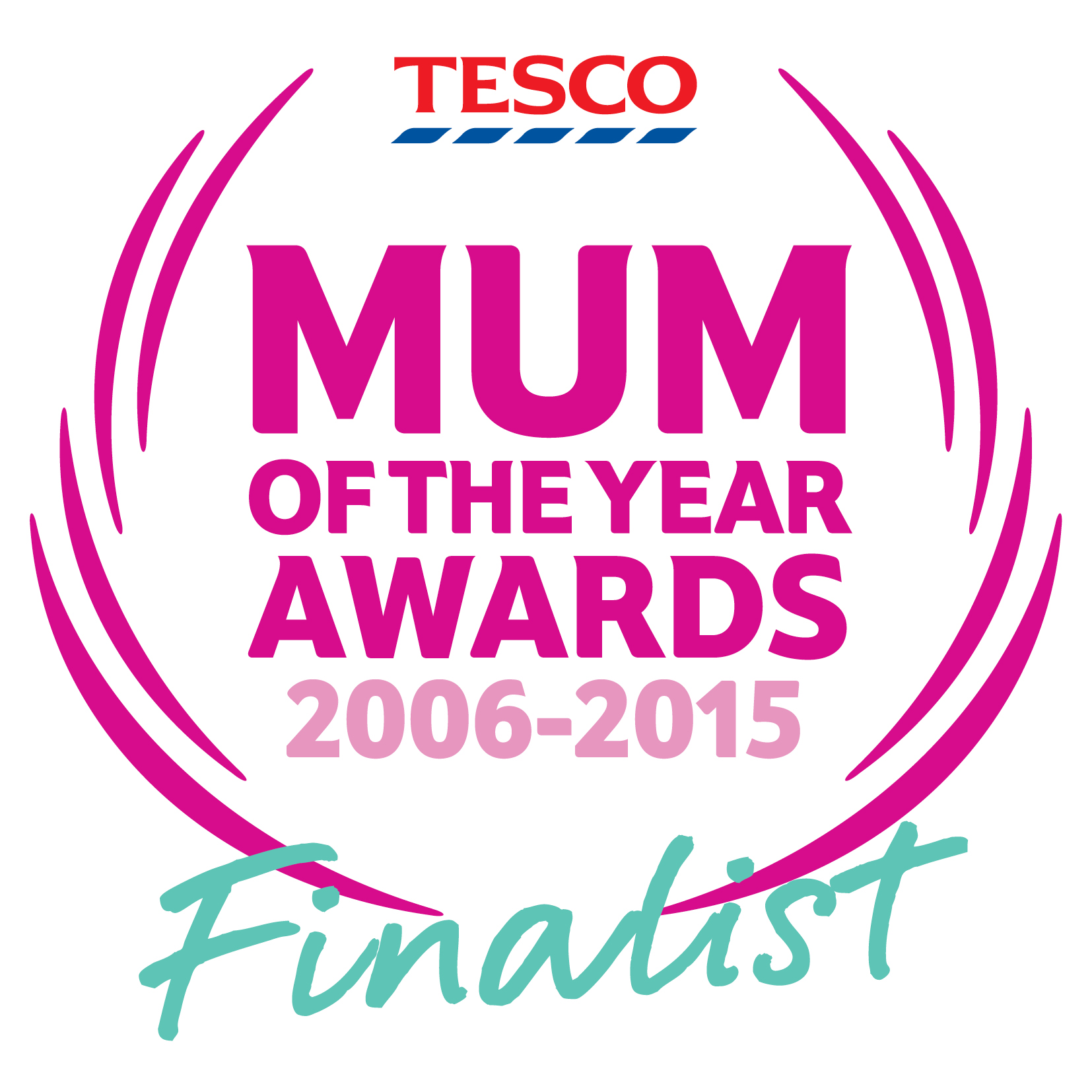TALKING PANTS with Carol Smillie
When I was pregnant I wet myself almost every time I spewed up, which was A LOT... there I've said it, on the internet for all to see. And quite frankly, after pushing three kids out of my vagina, my day to day continence isn't what it once was regardless of the hyperemesis. So, imagine my delight when I saw Carol Smillie's pants last year... they are made for women like me. But over to Carol the Knicker Queen to tell you about her own run in with pregnancy sickness and her fabulous undies for leaky ladies...
TALKING PANTS with Carol Smillie MD, DiaryDoll

It sounds ridiculous, but one of my biggest fears of becoming pregnant , wasn’t the birth, but the morning sickness.
From a very young age, I had a phobia of being sick, and even today, as a 54 year old woman, I can still remember a couple of incidents of other kids vomiting at school and being utterly traumatised by the sight of it.
I always wanted to become a mother, so I hoped I might be one of the 25% of mothers who sail through pregnancy without the slightest gag.
How wrong I was.
It was as if mother nature was trying to ‘cure’ me of my phobia, or ‘normalise’ what became a daily event, I went through three successive pregnancies with my head down the loo every morning, and several times throughout the day, just for good measure!
I kept telling myself it would pass, and that I should pull myself together. How the hell was I going to cope with sicky babies or poorly children, if I couldn’t cope with my own nausea?
Of course, that was all a long time ago, as my kids are now 17,19 and 21, but I’d still do pretty much anything rather than revisit those feelings now.
After a lengthy career in television, I am now less about Changing Rooms and more about Changing Careers, as I have my own company ‘DiaryDoll’ , making pretty, clever pants with a secret waterproof panel for life’s little leaks.
I’ll let you digest that for a moment.
Yes, I have inadvertently become a warrior for leaky ladies of all ages.
Heavy periods, pelvic floor weakness and post maternity all mean we , as women, are subject to leaks at some point or another, and if, like me, you have morning sickness, the sheer effort of retching when pregnant, may give you more problems than one, if you know what I mean! Remember that Bryan Ferry classic ‘Both Ends Burning?’
For a select few however, mother nature has reserved a very special extra bonus. Exclusive membership to an elite club for women with the most severe nausea and vomiting , who are unable to care for themselves or their families for weeks, sometimes months at a time.
Some of those may be unable to eat for long periods, even losing up to 5 - 10% or more of their pre-pregnancy body weight. It’s exhausting enough becoming a new mother, but this extreme fatigue, can even lead to depression.
I’m always amazed at how reluctant we are to ask for help, or to even admit that we need it. There is no shame in putting your hand up, motherhood is a hard slog at the best of times, but we mustn’t forget that our role as mothers is vital, and sometimes the handbook doesn’t have all the answers, we need to call upon professional help.
If you’re reading this, then I am probably preaching to the converted, and you already know more than I did about hyperemesis, but I’m learning every day.
Our DiaryDoll customers are very vocal, about a whole range of topics, from laughter leaks in the gym, worries about our daughter’s first period, to living with Endometriosis.
Come along, join the throng, we have a wonderful team spirit, and we’d love to hear from you!
For more details https://diarydoll.com
Share with...
UK�s First National Pregnancy Sickness Telephone Counselling Service
Back in May of this year Pregnancy Sickness Support held its biennial Volunteer Conference in Bristol.
Michelle Nicholson presented her MSc Dissertation qualitative research detailing the beneficial effects of writing therapy for women who have suffered all levels of pregnancy sickness. (You can read more about this here)
As a BACP Registered and Accredited Counsellor and two times pregnancy sickness survivor, Michelle has now set up the UK's first national pregnancy sickness telephone counselling service...


Share with...
Comments
Contributing to medical research
I handed the blog over to Dr Margaret O’Hara - HG survivor, medical physicist and Trustee of Pregnancy Sickness Support to talk about our current research and the importance of NVP and HG sufferers and survivors being involved.

One of the aims of PSS is to highlight women’s experiences of HG to healthcare professionals and the wider public. This isn’t just about raising awareness so that women will have some support for the condition, although that is very important. We also want to contribute to medical research so that the questions which researchers seek to answer are sensible and useful. You will never uncover anything useful if the question you are asking in the first place is based on poor assumptions.
We know that this isn’t just an academic issue, these research results feed back into people’s beliefs about HG, and that directly impacts women. An example of this is the lack of agreement over the recurrence rates for HG, in other words if you’ve had HG once, how likely are you to have it again. At PSS, we often hear of a woman going to their GP again after a first HG pregnancy and being told ‘Oh every pregnancy’s different, you probably won’t get it again.’ So, feeling reassured, she embarks on another pregnancy, gets HG (because actually the recurrence rate is very high) but she has done no preparation and is now caught out with another child to look after and not enough support. We also know that women in this situation are more likely to be forced to terminate the pregnancy.
So the stakes are very high indeed, and good quality information is essential. You would think it would be easy to find out how likely HG is to recur again – surely you could simply ask women who have had HG and then have another pregnancy and count how many get it again? This is one approach, but unfortunately, this hasn’t always been the way it’s done. It is also complicated by the fact that we don’t have a good definition of what constitutes HG that everyone agrees on. Historically, HG has been defined, in part, by the treatment – i.e. if you ended up in hospital on a drip for dehydration, then you’ve had HG. If you didn’t, then you haven’t. Again, this is one of these situations which women who’ve had HG will find bewildering.
What if you tried to get IV fluids but you were sent home by a doctor who didn’t think your ketones were high enough? Compare a woman who gets antiemetics as soon as she requests them so manages to drink a little, with a woman who is left with no medication so can’t eat or drink anything at all. Or compare one women whose partner brings food and drink to her bedside, with one who has nobody to help so has to get up to go to the kitchen for a drink which sets off a vomiting bout that she can’t control. The former might avoid a hospital admission, while the latter doesn’t. Does the first one not have HG? According to the strict definition, no she doesn’t.
One of the main studies on recurrence of HG was based purely on hospital records for admissions for fluids. They didn’t even contact any of the women to ask them about their experiences. They found that 15% of the women with a first admission to hospital for HG came back in on a subsequent pregnancy. Based on this, they reported that there is a 15% chance of recurrence. The study was done in Norway, and what we know from women in Norway, is that the model of care for women with HG during the time of the study, was based on the idea that women with HG were making themselves sick and needed to be shocked into pulling themselves together. They were isolated in a dark room, refused visitors for the entire stay, and forced to try and eat. You can imagine that if this was the prospect of a hospital admission, you would be very strongly motivated not to go anywhere near a hospital in your next pregnancy. A Norwegian woman that we know told us that she put in place a lot of family support for her next pregnancy and avoided admission, but she was every bit as ill as she had been in the first pregnancy. As far as she is concerned, she had HG in both pregnancies. As far as the researchers are concerned she only had it once.
Compare this with research done by a group in the USA which involved former sufferers, where they asked women to describe their symptoms and didn’t just rely on hospital records. They found that the recurrence rate was 86%. Other studies find a recurrence rate in between these numbers and none of them agree on what combination of symptoms and treatments constitutes a diagnosis of HG.
This is why it is very important for patients to be involved in research, especially for conditions like HG which are poorly described, and suffered alone out of sight of anyone. We, as a body of patients, have knowledge about our condition which is simply not seen outside of our circles. At PSS, we want to try to bring out that knowledge and have it published in academic literature where healthcare professionals will see it and take notice.

Spewing Mummy and I design surveys to answer specific questions to address some of the knowledge gaps and misconceptions which exist because of poorly done research in the past. We want to get the full picture out there so that ultimately it will feed back into better care. So that in future you will go to your GP to discuss another pregnancy and they will say, yes, the recurrence rate is very high, let’s make a plan for your next pregnancy so that we’re prepared for the worst.
We have a survey open at the moment for women who have had more than one HG pregnancy in the UK lasting at least 30 weeks in the past ten years. We are inviting anyone who is eligible to follow the link below to tell us your experience. All the answers are anonymous and we will write up the results for publication. We hope that you will relish the opportunity to set the record straight and shed light on how things really are for women with HG, and thank you in advance for taking part.
Share with...
Comments
A week on the ground
As you know I’m the Chairperson for the National Hyperemesis Gravidarum charity Pregnancy Sickness Support which runs a helpline and a national support network of volunteers which I set up nearly 5 years ago. The network started as a small group of trustees each with a spreadsheet of three or four volunteers in their geographical region who they’ll have spoken on the phone to at some point. When a women suffering hyperemesis would find our website she would fill in an online form and it would go to the trustee running her area and at some point, hopefully within a week they would get in touch with her and match her with a volunteer. And when I say their geographical area I’m talking the whole of Scotland, the whole of the South West and so on. A woman in Penzance might be supported by someone in Gloucester!
As the website was found more easily the contacts from sufferers increased month on month and as the wonders of Social Media platforms grew such as Facebook, with all it’s brilliance and nightmarishness combined, so did the pool of volunteers. Within a year we were putting in place formal application forms and interviews for volunteers and taking registration details for sufferers. Particularly as we learned from challenges such as Munchausen By Internet, a mental health condition in which physically well people seek intense online support for conditions they don’t have, such as hyperemesis gravidarum.
By the following summer we had grown to the point of requiring our first paid employee, for 10 hours per week, who put in place structures such as policies and guidelines for volunteering, guidance for professional support and a thorough online training package. We also computerised our feedback systems and invested in a mobile phone for the Charity. At this point the helpline was still an answerphone system where a message would be left and we would aim to get back to them within 48 hours.

Fast forward another three years through various ups and downs, challenges and successes and what we have today is simply incredible… we have an office with an actual phone line which rings and can be answered when a sufferer calls the helpline. It’s open Monday to Friday 9am – 4.30 and messages left outside this time are responded to the next working morning. We have a network of over 235 volunteers the length and breadth of the UK. From the Ilse of Harris to Penzance, in every major town across the country and many rural areas too. We have a forum with members numbering 2,500 and when hyperemesis gravidarum is in the news it’s us the press call for comment. Our leaflets can be found in numerous early pregnancy units these days and we’ve had GPs and midwives call our helpline for support in treating their patients.
And yet we have no formal funding! We’ve been rejected from the Lottery, the Tampon Tax Fund and so far every trust and grant giving organisation we’ve applied to.
This week I’ve been covering the Helpline for our, now FULL TIME employee which she was on annual leave. It’s been a while since I’ve answered the helpline for a full week and I truly enjoyed it. It’s humbling to speak to women who are going through HG now as my own memory fades with the passage of time (My daughter starts school on Tuesday!). Thankfully, since the helpline started the reports of poor care and dismissive attitudes are definitely diminishing. Yet just today I spoke to a dangerously dehydrated women whose doctor yesterday told her she didn’t want to admit her as she’s only six weeks pregnant… Umm what difference does that make? She’s been seriously ill for two weeks, cannot keep down oral medication and has barely drank 100 mls of fluid in over 24 hours most of which was vomited up. Her urine is the colour of Lucozade!
But as I say, these cases are becoming rarer… WE ARE HAVING AN IMPACT! For the majority of women I was a listening ear, reassurance that they were on safe medication and giving information about the other options to discuss with their, predominantly helpful, doctors. And I was able to match them with a volunteer. Our volunteers are just incredible! No woman waited more than a couple of hours to be matched and many were matched within about 20 minutes. Their volunteers will now text them at least daily to see how they are, provide ongoing support, a shoulder to cry on an ear to listen and sympathy over being “gingered”. They’ll empower them to advocate for themselves and ensure they know their rights and what treatments are available. They’ll be with them through the long months ahead and some will go on to become friends, living in the same towns and able to collaborate on ways to improve services locally. Hopefully most of the ladies I spoke to this week will also go on to volunteer and fundraise for us.
So whether you are a volunteer or a sufferer or relative or just have an interest in the condition… take heart, things are changing, we are making a difference and having an incredible impact. Keep up the great work and if you’re able please consider donating.
Donate to Pregnancy Sickness Support
Share with...
Comments
Blog archive
2017February 2017 (1)January 2017 (5)2016November 2016 (1)October 2016 (1)September 2016 (4)August 2016 (1)July 2016 (1)June 2016 (3)April 2016 (2)February 2016 (2)January 2016 (1)2015December 2015 (2)November 2015 (1)October 2015 (1)September 2015 (1)August 2015 (1)July 2015 (3)June 2015 (5)May 2015 (3)April 2015 (3)March 2015 (3)February 2015 (5)January 2015 (3)2014December 2014 (1)November 2014 (4)October 2014 (4)September 2014 (3)August 2014 (4)July 2014 (3)June 2014 (2)May 2014 (5)April 2014 (5)March 2014 (5)February 2014 (4)January 2014 (5)2013December 2013 (6)November 2013 (6)October 2013 (10)September 2013 (5)July 2013 (1)June 2013 (1)April 2013 (1)March 2013 (2)February 2013 (1)2012December 2012 (1)June 2012 (1)February 2012 (1)2011December 2011 (1)November 2011 (1)October 2011 (1)September 2011 (1)July 2011 (2)June 2011 (1)May 2011 (6)April 2011 (1)The Book

The Kids Book

About Me
 I am mother of three beautiful children and wife to a fantastic and supportive husband. I am a nurse, a farmer and a trustee for Pregnancy Sickness Support. I love working hard and spending time with my kids.
I am mother of three beautiful children and wife to a fantastic and supportive husband. I am a nurse, a farmer and a trustee for Pregnancy Sickness Support. I love working hard and spending time with my kids.
About this blog
Information and support for pregnancy sickness and hyperemesis gravidarum. Views are my own and do not represent those of any other organisation. Information provided here should not be a substitute for medical advice. My aim is to raise awareness and encourage sufferers to know they are not alone.
Previous award nominations



Archive
Explore past posts:
2017February 2017 (1)January 2017 (5)2016November 2016 (1)October 2016 (1)September 2016 (4)August 2016 (1)July 2016 (1)June 2016 (3)April 2016 (2)February 2016 (2)January 2016 (1)2015December 2015 (2)November 2015 (1)October 2015 (1)September 2015 (1)August 2015 (1)July 2015 (3)June 2015 (5)May 2015 (3)April 2015 (3)March 2015 (3)February 2015 (5)January 2015 (3)2014December 2014 (1)November 2014 (4)October 2014 (4)September 2014 (3)August 2014 (4)July 2014 (3)June 2014 (2)May 2014 (5)April 2014 (5)March 2014 (5)February 2014 (4)January 2014 (5)2013December 2013 (6)November 2013 (6)October 2013 (10)September 2013 (5)July 2013 (1)June 2013 (1)April 2013 (1)March 2013 (2)February 2013 (1)2012December 2012 (1)June 2012 (1)February 2012 (1)2011December 2011 (1)November 2011 (1)October 2011 (1)September 2011 (1)July 2011 (2)June 2011 (1)May 2011 (6)April 2011 (1)Online recommendations
- Best Non Gamstop Casinos 2025
- UK Casinos Not On Gamstop
- Casinos Not On Gamstop
- UK Casinos Not On Gamstop
- Non Gamstop Casino
- Best Betting Apps
- Best Non Gamstop Casinos
- Gambling Sites Not On Gamstop
- Non Gamstop Casino Sites UK
- Slot Sites Not On Gamstop
- Casino Not On Gamstop
- Best Non Gamstop Casinos
- Best Casino Sites Not On Gamstop 2025
- Non Gamstop Casinos
- Casino Sites UK Not On Gamstop
- Non Gamstop Casino UK
- Non Gamstop Casino UK
- Non Gamstop Casinos
- Slots Not On Gamstop
- Slots Not On Gamstop
- UK Casino Sites Not On Gamstop
- UK Casinos Not On Gamstop



Comments